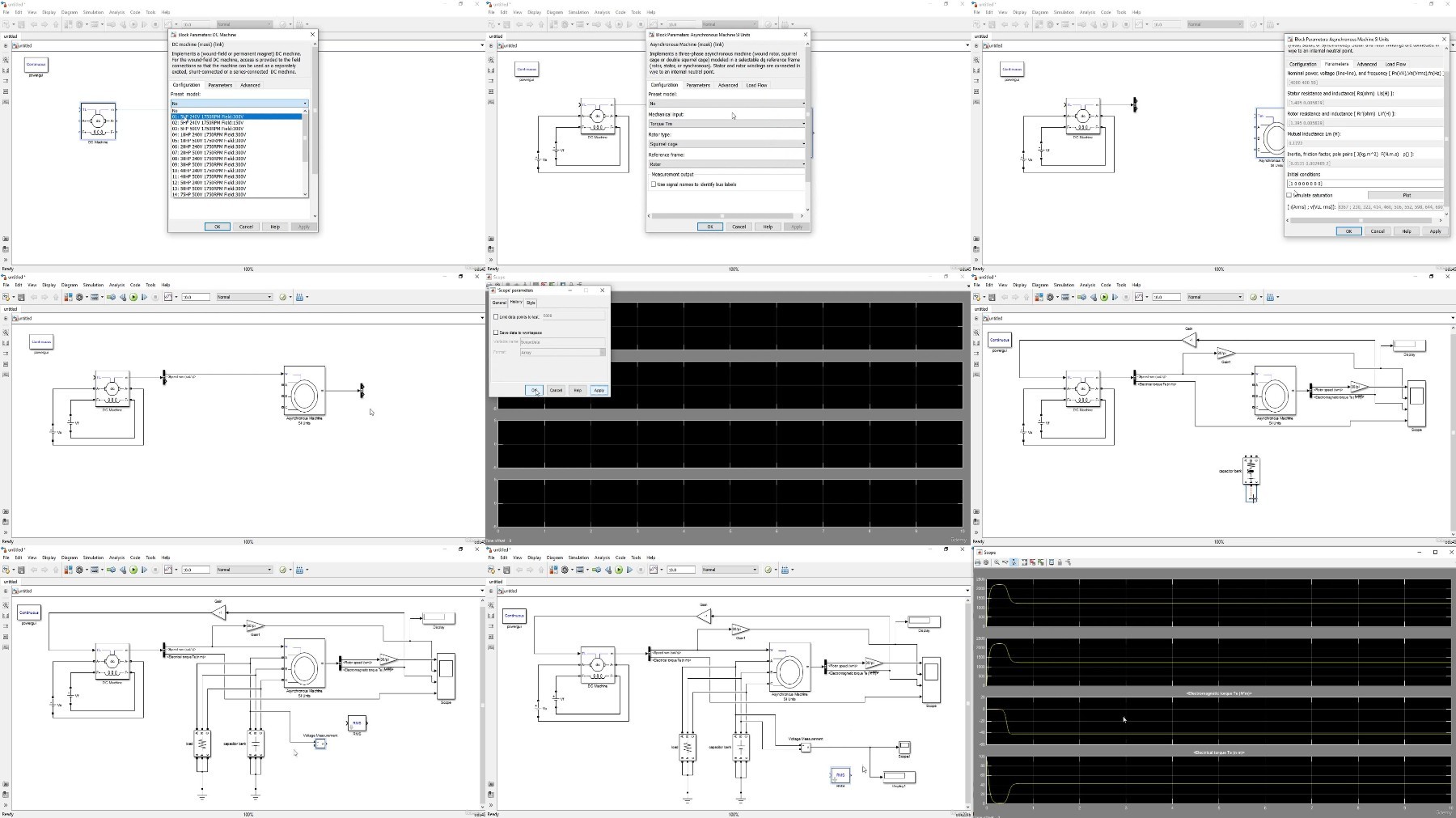Most Commented
Udemy - Mastering Electrical Machines Theory, Design, Applications




Description material

20.85 GB | 00:25:07 | mp4 | 1280X720 | 16:9
Genre:eLearning |Language:English
Files Included :
1 -Introduction ot DC machines (37.44 MB)
10 -Slip rings vs Commutators (52.05 MB)
11 -DC motor working principle (122.12 MB)
12 -Role of commutators in DC motors (27.57 MB)
13 -Equivalent circuit of DC machine (50.98 MB)
14 -Types of armature winding (62.51 MB)
15 -Lap winding (96.21 MB)
16 -Wave winding (47.96 MB)
17 -Armature voltage equation (87.54 MB)
18 -Developed torque equation (59.74 MB)
19 -Solve example 1 (105.01 MB)
2 -Applications of DC machines (57.83 MB)
20 -Solved example 2 (31.21 MB)
21 -Magnetization curve of DC machines (98.57 MB)
22 -DC machine classifications (46.76 MB)
3 -DC machine construction (97.61 MB)
4 -Yoke, poles, and field winding (95.43 MB)
5 -Rotor core and armature winding (73.51 MB)
6 -Commutators and brushes (69.21 MB)
7 -DC generator working principle (56.61 MB)
8 -Is the generated voltage AC or DC (138.89 MB)
9 -Role of commutators in DC generators (85.85 MB)
1 -Construction (85.77 MB)
10 -Example 1 - Generator model (64.07 MB)
11 -Example 2 - Performance parameters of alternators (92.54 MB)
2 -Salient pole vs cylindrical rotor generators (70.13 MB)
3 -Alternator working principle (91.62 MB)
4 -Induced EMF Equation (56.08 MB)
5 -Magnetization curve of synchronous generators (32.96 MB)
6 -Generator equivalent circuit (79.64 MB)
7 -Phasor diagram of synchronous generators (51.18 MB)
8 -Performance parameters (74.28 MB)
9 -Power angle curve (74.21 MB)
1 -Terms related to armature winding (53.82 MB)
2 -Features of armature winding (118.33 MB)
3 -Pole pitch, Coil span, and Slot angle (64.58 MB)
4 -Armature winding terminology (81.68 MB)
5 -Turns, Conductors, and Parallel paths in armature winding (45.31 MB)
6 -Types of armature winding (40.69 MB)
7 -Application 1 Single layer winding diagram (123.31 MB)
8 -Application 2 Double layer winding diagram (67.14 MB)
1 -Armature voltage formula (69.82 MB)
10 -Third harmonic elimination in DELTA Connection (69.48 MB)
11 -Solved example 3 (67.2 MB)
2 -Assumptions made for EMF equation (49.45 MB)
3 -Effect of chording (Kc) (50.66 MB)
4 -Effect of distributed winding (Kd) (99.48 MB)
5 -Solved example 1 (79.45 MB)
6 -Effect of flux distribution under the rotor poles (59.26 MB)
7 -Harmonics in armature voltage (71.56 MB)
8 -Solved example 2 (50.61 MB)
9 -Third harmonic elimination in STAR Connection (69.07 MB)
1 -Introduction (24.48 MB)
2 -Automatic Voltage Regulator (AVR) (100.61 MB)
3 -Automatic Load Frequency Control (ALFC) (119.3 MB)
4 -DC Exciter (46.95 MB)
5 -Brushless Exciter (80.43 MB)
6 -Static Exciter (42.22 MB)
1 -Generator model parameters (24.09 MB)
2 -DC test (118.78 MB)
3 -Open circuit test (114.34 MB)
4 -Short circuit test (68.23 MB)
5 -Synchronous reactance calculation (78.54 MB)
6 -Short Circuit Ratio (SCR) (89.88 MB)
7 -Solved example 1 (81.19 MB)
8 -Solved example 2 (53.94 MB)
9 -Solved example 3 (96.38 MB)
1 -Operating conditions of alternator (41.4 MB)
10 -Voltage-Reactive power characteristics (54.17 MB)
11 -Solved example 2 (58.9 MB)
2 -Steps of operation of stand-alone generator (41.24 MB)
3 -Analysis and rules (71.29 MB)
4 -Voltage and Power angle calculation (34.93 MB)
5 -Active and Reactive power Vs Power angle (86.08 MB)
6 -Solved example 1 (125.7 MB)
7 -Case study Effect of frequency change on alternator (93.6 MB)
8 -Effect of load changes on islanded generator (128.1 MB)
9 -Frequency-Power characteristics (80.96 MB)
1 -Introduction (32.34 MB)
10 -House diagram (53.02 MB)
11 -Excitation and Governer effects on SG connected to grid (69.03 MB)
12 -SG operating alone vs SG in parallel with grid (30.02 MB)
2 -What is infinite bus (IB) (47.57 MB)
3 -Synchronization conditions (57.34 MB)
4 -Synchronization process (109.92 MB)
5 -Practical synchronization of alternator in lab (103.31 MB)
6 -What is after perfect synchronization (30.53 MB)
7 -Role of excitation control system (61.16 MB)
8 -Role of governor control system (143.77 MB)
9 -Comprehensive solved example (153.18 MB)
1 -Advantages of Parallel Operation (79.16 MB)
2 -Conditions Required for Paralleling (73.7 MB)
3 -Analysis of parallel synchronous generators (62.81 MB)
4 -Governer set point effects on parallel alternators (30.95 MB)
5 -Field current control effects on parallel alternators (37.14 MB)
6 -Comprehensive solved example (107.85 MB)
1 -Synchronous generator nameplate (94.06 MB)
2 -Frequency and speed ratings (29.65 MB)
3 -Voltage ratings (67.6 MB)
4 -Power ratings (44.27 MB)
5 -Power factor ratings (90.54 MB)
6 -P-Q chart (60.73 MB)
7 -Capability diagram of synchronous generators (73.6 MB)
8 -Short time operation of alternator (56.75 MB)
9 -Service factor SF of alternators (43.7 MB)
1 -Introduction (25.73 MB)
2 -Difference between salient and non-salient machines (64.85 MB)
3 -Two reaction theory (49.09 MB)
4 -Phasor diagram of salient pole generator (76.78 MB)
5 -EMF calculation (85.83 MB)
6 -Power angle equation (61.89 MB)
7 -Effect of saliency (50.7 MB)
8 -Complete numerical example (106.95 MB)
1 -Types of DC generators (82.12 MB)
10 -Voltage build up process of shunt generators (87.85 MB)
11 -Reasons for voltage build up failure in shunt generators (67.13 MB)
12 -Solved example 4 (90.18 MB)
13 -Series excited DC generator (86.19 MB)
14 -Compound DC generators (79.26 MB)
15 -Characteristics of compound generators (98.95 MB)
16 -Design of series winding in compound generators (70.18 MB)
17 -Solved example 5 (67.51 MB)
18 -Applications of DC generators (154.37 MB)
19 -Solved example 6 (31.32 MB)
2 -Separately excited DC generator (47.39 MB)
3 -Solved example 1 (30.72 MB)
4 -Armature reaction concept (82.67 MB)
5 -Effect of armature reaction on DC generators (82.07 MB)
6 -Load characteristics of separately excited DC generator (79.48 MB)
7 -Solved example 2 (90.14 MB)
8 -Shunt excited DC generator (85.61 MB)
9 -Solved example 3 (26.11 MB)
1 -Construction (64.26 MB)
10 -Effect of changing the excitation on the motor (86.28 MB)
11 -V Curves of synchronous motor (50.8 MB)
12 -Numerical example 3 (99.53 MB)
13 -Why are synchronous motors not self starting ! (71.89 MB)
14 -Starting methods of synchronous motors (84.55 MB)
2 -Working principle (84.04 MB)
3 -Motor model and phasor diagram (68.52 MB)
4 -Synchronous condenser (P F correction) (57.9 MB)
5 -Torque – Speed curve & motor developed power (57.93 MB)
6 -Reluctance motor (98 MB)
7 -Numerical example 1 (88.03 MB)
8 -Effect of mecahnical load changes on the motor (118.55 MB)
9 -Numerical example 2 (120.12 MB)
1 -Introduction to machine design (88.11 MB)
10 -Stator winding design (46.8 MB)
11 -Stator conductor design (98.44 MB)
12 -Yoke design (41.85 MB)
13 -Estimation of Stator resistance, Cu loss, and Weight of Copper (55.61 MB)
14 -Design problem 1 (121.43 MB)
15 -Design problem 2 (172.04 MB)
2 -Difference in design between salient and non-salient pole machines (96.95 MB)
3 -Specific magnetic loading (113.99 MB)
4 -Specific electric loading (67.02 MB)
5 -Output equation (130.28 MB)
6 -Design of machine main dimensions (81.51 MB)
7 -Stator core design (86 MB)
8 -Design of stator slots (94.34 MB)
9 -Slot and tooth dimensions (51.66 MB)
1 -Rotor design details (55.42 MB)
2 -Design of rotor pole sectional area (79.11 MB)
3 -Design of rotor pole height (78.5 MB)
4 -Estimation of field coil height (176.15 MB)
5 -Factors affecting the choice of air gap length (56.44 MB)
6 -Air gap design (94.73 MB)
7 -Design problem 3 (151.92 MB)
8 -Design of field coil system (134.1 MB)
9 -Design problem 4 (137.27 MB)
1 -Project 1 Stand alone synchronous generator simulation (86.3 MB)
2 -Project 2 Voltage and frequency control of alternator (128.42 MB)
3 -Project 3 Grid connected synchronous generator simulation (94.67 MB)
4 -Project 4 Synchronous motor simulation (124.49 MB)
1 -Why Exactly Induction Motors (39.5 MB)
10 -Solved Example 3 (32.48 MB)
2 -Construction Of Three Phase Induction Motors (35.57 MB)
3 -Slip Ring Induction Motor vs Squirrel Cage Induction Motor (47.58 MB)
4 -Theory of Operation of Induction Motors (57.23 MB)
5 -Equivalent circuit and motor model (55.95 MB)
6 -Power Flow Diagram In Induction Motors (37.4 MB)
7 -Torque-Speed Characterstics of 3-phase Induction Motors (60.39 MB)
8 -Solved Example 1 (30.07 MB)
9 -Solved Example 2 (25.21 MB)
1 -Necessity For Starters (49.58 MB)
2 -Direct on Line ( DOL ) Starter (45.65 MB)
3 -StartDelta Starter (45.44 MB)
4 -Implementation of StarDelta Starter (81.7 MB)
5 -Auto-Transformer Starter (75.37 MB)
6 -Soft Starter Of Induction Motors (55.6 MB)
7 -Rotor Resistance Starter (79.82 MB)
8 -Conclusion and Comparison Beween Different Starting Methods (32.69 MB)
9 -Practical Example on Different Starting Methods (87.44 MB)
1 -Introduction (27.65 MB)
2 -Stator Voltage Speed Control (45.7 MB)
3 -Supply Frequency Speed Control (64.09 MB)
4 -VF Speed Control (44.86 MB)
5 -What Is Variable Frequency Drive ( VFD ) (15.08 MB)
6 -How Does VFD Work (63.72 MB)
7 -Rotor Resistance Control (57.97 MB)
8 -Slip Energy Recovery Control (29.27 MB)
1 -Why Single-Phase Induction Motors (26.32 MB)
10 -Capacitor Run Induction Motors (13.24 MB)
11 -Capacitor Start - Capacitor Run Induction Motors (19.08 MB)
12 -Conclusion and Comparison (11.84 MB)
13 -Solved Example 1 (26.9 MB)
14 -Solved Example 2 (32.51 MB)
2 -Construction (9.19 MB)
3 -Operation (Pulsating Field vs Rotating Field) (19.61 MB)
4 -Double Revolving Theory (23.68 MB)
5 -Torque-Speed Characterstics (18.25 MB)
6 -Why 1-Phase I M is not Self-Staring (23.67 MB)
7 -Starting of Single Phase Induction Motors (37.09 MB)
8 -Split Phase Induction Motors (34.44 MB)
9 -Capacitor Start Induction Motors (32.08 MB)
1 -DC test (35.8 MB)
2 -No load test (46.35 MB)
3 -Blocked rotor test (39.3 MB)
1 -Copper losses in DC machines (53.41 MB)
10 -Solved example 2 (124.81 MB)
11 -Solved example 3 (98.89 MB)
2 -Hysteresis losses in DC machines (88.79 MB)
3 -Eddy current losses in DC machines (50.18 MB)
4 -Mechanical losses (28.03 MB)
5 -Constant and variable losses (35.21 MB)
6 -Power flow diagram in DC generators (50.54 MB)
7 -Generator efficiency and regulation (44.34 MB)
8 -What is the condition for maximum generator efficiency (84.31 MB)
9 -Solved example 1 (67.99 MB)
1 -Introduction to induction generators (49.55 MB)
2 -Types of induction generators (24.28 MB)
3 -Grid connected induction generator (38.79 MB)
4 -Application Wind turbine generators (27.81 MB)
5 -Self excited induction generator (SEIG) (58.35 MB)
6 -Build-up voltage of SEIG (35.74 MB)
7 -Reasons for build-up voltage failure in SEIG (38.17 MB)
8 -Solved example on induction generator (71.44 MB)
9 -Doubly fed induction generator (DFIG) (132.14 MB)
1 -Project 1 Three phase induction motor simulation (173.44 MB)
10 -Project 10 No load test simulation (119.19 MB)
11 -Project 11 Blocked rotor test simulation (74.99 MB)
12 -Project 12 Self excited induction generator simulation (181.61 MB)
13 -Project 13 Grid connected induction generator simulation (111.35 MB)
2 -Project 2 Voltage control of induction motor (115.46 MB)
3 -Project 3 VF control (121.93 MB)
4 -Project 4 VF control using variable frequency drives (VFD) (115.42 MB)
5 -Project 5 Closed loop speed control using VFD (132.57 MB)
6 -Project 6 Soft starter of induction motors (82.06 MB)
7 -Project 7 Rotor resistance speed control (147.45 MB)
8 -Project 8 Stator resistance speed control (50.42 MB)
9 -Project 9 DC test simulation (43.2 MB)
1 -DC motors Classification (41.59 MB)
10 -The need for motor starters (38.1 MB)
11 -Starting methods of DC motors (60.21 MB)
12 -What is DC motor starter (35.68 MB)
13 -DC motor starter working principle (71.82 MB)
14 -DC motor starter design (40.02 MB)
15 -Numerical example on Practical DC starter design (92.36 MB)
2 -Separately excited DC motor (46.8 MB)
3 -Torque-Speed Characteristics of DC motors (163.15 MB)
4 -Back EMF and its significance in DC motors (89.93 MB)
5 -Shunt DC motors (26.46 MB)
6 -Series DC motors (102.83 MB)
7 -Compound DC motors ( Cumulative & Differential ) (105.91 MB)
8 -DC motor performance parameters (64.63 MB)
9 -DC motor applications (53.77 MB)
1 -Methods of motor speed control (37.14 MB)
2 -Terminal voltage control (69.06 MB)
3 -Field flux control (81.06 MB)
4 -Armature resistance control (32.65 MB)
5 -Speed control of series motors (72.06 MB)
6 -Numerical example 1 (98.79 MB)
7 -Numerical example 2 (120.86 MB)
8 -Numerical example 3 (81.59 MB)
1 -Introduction to DC machine testing (35.76 MB)
10 -Retardation test procedure (68.38 MB)
11 -Numerical example on retardation test (48.94 MB)
2 -Apparatus and meters used in lab (61.19 MB)
3 -Armature and field winding measurement (59.75 MB)
4 -No load test of DC generator (125.71 MB)
5 -Load test of separately excited generator (103.77 MB)
6 -Load test of shunt generator (87.39 MB)
7 -Load test of compound generator (90.18 MB)
8 -What is retardation test (86.97 MB)
9 -Theory and calculation steps of retardation test (91.89 MB)
1 -Project 1 Separately excited motor simulation (66.01 MB)
2 -Project 2 Plotting Torque-Speed curve of DC motor in MATLAB (48.88 MB)
3 -Project 3 Speed control of DC motors in MATLAB (55.13 MB)
4 -Project 4 Shunt and Series motors simulation (42.21 MB)
5 -Project 5 DC motor Starting in MATLABSimulink (150.33 MB)
6 -Project 6 Modelling of DC motor in MATLABSimulink (157.33 MB)
7 -Project 7 DC generator simulation (39.02 MB)
1 -Assignment on DC machines (13.23 MB)
2 -Assignment solution (8.4 MB)
1 -Introduction, Types, and Features of synchronous machines (109.36 MB)
2 -Windings of synchronous machines (50.09 MB)
3 -Difference in design between DC & Synchronous machines (48.72 MB)
4 -Applications of synchronous generators (50.84 MB)
5 -Applications of synchronous motors (56.24 MB)
6 -Number of poles and pole pairs (38.1 MB)
7 -Frequency - Speed relation (62.33 MB)
8 -What is relation between Electrical and Mechanical angle (23.33 MB)
[center]
Screenshot

[/center]
Warning! You are not allowed to view this text.
Warning! You are not allowed to view this text.
Warning! You are not allowed to view this text.
Join to our telegram Group
Information
Users of Guests are not allowed to comment this publication.
Users of Guests are not allowed to comment this publication.
Choose Site Language
Recommended news
Commented


![eM Client Pro 9.2.1735 Multilingual [Updated]](https://pikky.net/medium/wXgc.png)






![Movavi Video Editor 24.0.2.0 Multilingual [ Updated]](https://pikky.net/medium/qhrc.png)

